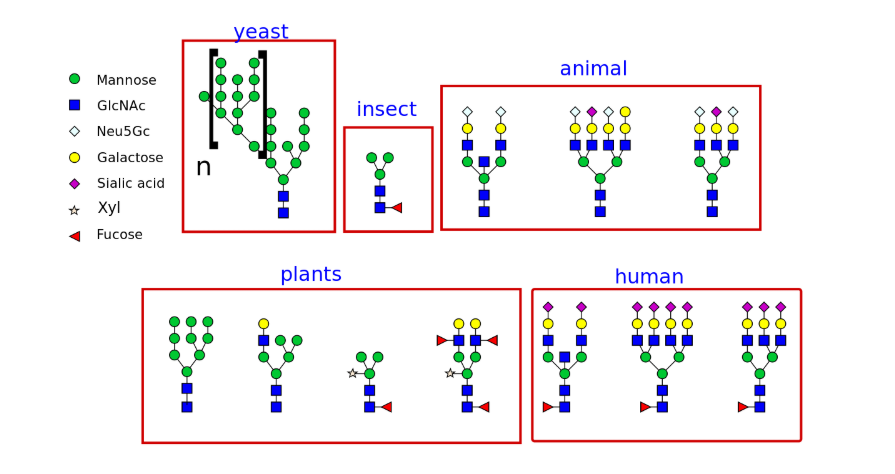N-Glycan Profiling Service
Glycosylation is a pivotal post-translational modification that attaches monosaccharides or oligosaccharides to proteins, influencing their structure and functionality. This modification enhances molecular diversity but introduces challenges in analysis due to the complexity and variability of glycan structures.
N-glycosylation, the predominant form of glycosylation, involves linking glycan groups to the asparagine side chain of proteins. It is essential for regulating biological processes such as protein-receptor interactions, immune responses, and the secretion and transport of proteins. N-glycosylation plays a crucial role in disease development, making the analysis of N-glycan structures and their functional relationships vital for understanding disease mechanisms, diagnostics, monitoring, and the development and quality control of biotherapeutics.

Figure1. Different Types of N-Glycans Produced in Different Organisms
Services at MtoZ Biolabs
MtoZ Biolabs employs advanced LC-MS technologies, including Matrix-Assisted Laser Desorption/Ionization Time of Flight Mass Spectrometry (MALDI-TOF MS) and Hydrophilic Interaction Liquid Chromatography coupled with Ultra High Performance Liquid Chromatography Mass Spectrometry (HILIC-UHPLC MS), to deliver precise N-glycan profiling services that ensure comprehensive and accurate glycosylation analysis:
1. MALDI-TOF MS
This high-sensitivity technique is extensively used for high-throughput screening and in-depth glycosylation profiling. N-glycans are released using specific enzymes like N-glycanase A or F, followed by rapid positive ion mode analysis targeting methylated and sialylated glycans.
(1) Full Methylation Analysis: Methylation with iodomethane enhances ionization efficiency and stabilizes sialylated glycans, analyzed using MALDI-TOF MS.
(2) Sialylated N-Glycan Analysis: We use specialized esterification methods to stabilize sialic acids, distinguishing between α-2,3 and α-2,6 sialic acid bonds, and differentiating NeuNAc from NeuNGc residues.
2. HILIC-UHPLC MS
HILIC, combined with UHPLC-MS, uses procainamide [4-amino-N-(2-diethylaminoethyl) benzamide] as a fluorescent label, which shows higher electrospray ionization (ESI) efficiency and fluorescence intensity compared to traditional labels such as 2-aminobenzamide (2-AB) and 2-aminobenzoic acid (2-AA). This technology greatly enhances the detection sensitivity of low-abundance N-glycans.
Analysis Workflow
1. Protein Denaturation
Proteins are denatured to expose glycosylation sites for enzymatic cleavage and labeling.
2. Enzymatic N-Glycan Removal
Specific enzymes, typically PNGase F, are used to accurately remove N-glycans, preparing them for further analysis.
3. Specific Glycan Treatments
(1) Full Methylation: Enhances ionization and stability.
(2)Sialylation: Stabilizes and differentiates sialic acid residues.
(3)Fluorescent Labeling: Enhances detection efficiency, especially in low-abundance samples.
4. Mass Spectrometry Analysis
High-throughput and sensitive characterization of glycan structures using MALDI-TOF and HILIC-UHPLC MS.
5. Report Production
Finally, a detailed technical report is compiled based on the analysis results, providing structural information of the glycans and their biological significance, including analysis data, charts, and expert interpretations and recommendations.
Service Advantages
1. Superior Separation and Retention: Ensures clear separation and precise analysis.
2. State-of-the-Art Technology: We utilize the latest technologies for advanced analysis.
3. Efficient and Clear Results: Optimized workflows ensure quick results that are easy to understand.
4. High Throughput and Sensitivity: Capable of handling large volumes and detecting low-abundance samples with high sensitivity.
5. Reliable Test Stability and Consistency: Reduces the need for repeat testing through precise operations.
6. Customized Full-Service Solutions: From sample preparation to data analysis, we tailor our services to meet your specific needs.
MtoZ Biolabs provides cutting-edge N-glycan analysis services, ensuring every aspect of your glycosylation study is handled with precision and expertise. For further information or to discuss your specific analysis needs, please contact us at your convenience.
How to order?







